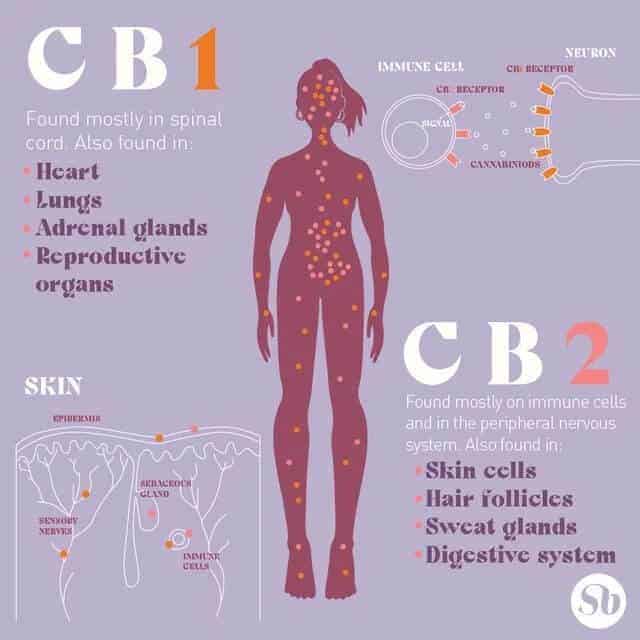Spend $50 and get FREE SHIPPING

Illustration by Sydney Kleinrock for Shea Brand.
The Endocannabinoid System is named after cannabis but it plays a much more important role in the body other than interacting with CBD. Did you know that the Endocannabinoid System is responsible for ensuring that basically every system in your body is running smoothly? Come and discover how the ECS balances your body and how CBD and other plants interact with it.
The health benefits we get from hemp and cannabis are all thanks to our Endocannabinoid System. If you’ve been reading Shea Brand’s educational blog posts about CBD, then you’ve heard us talk about this important system before, but what exactly is the Endocannabinoid System and how does it work?
What is the Endocannabinoid System?
The Endocannabinoid System (ECS) was discovered in the 1990’s when scientists studied the effects of cannabis on the human brain. They found that cannabinoids worked alongside this natural system within our bodies, which is integral to our health and wellness.
All vertebrate species have an ECS. In humans, ECS receptors are found on cells throughout the body including neurons, immune cells, skin cells, sweat glands, hair follicles, and the cells that make up our organs and other soft tissues. The endocannabinoid receptors on these cells interact with cannabinoids to regulate homeostasis, or balance, which is required by our bodies and minds in order to operate optimally.
The balance of our ECS affects metabolism, immune response, mood, sleep, memory, temperature, cardiovascular function, reproductive function, the way we feel pain, neural development, and much more.

How does the Endocannabinoid System work?
The ECS acts like a mind-body bridge, reading information from the body and reacting to it by sending signals to suppress or encourage systems activity. When our endocannabinoid receptors detect an issue, they release endocannabinoids to bring us back into balance. Once the body detects homeostasis, it then releases metabolic enzymes to get rid of the endocannabinoids that are no longer needed.
Endocannabinoids are produced naturally by our bodies. Anandamide, and 2-AG are the most common, with Anandamide being responsible for a number of different functions, including happiness.
Phytocannabinoids, on the other hand, come from plants. THC and CBD from hemp cannabis are the most well known, but phytocannabinoids are found in many different plants including echinacea, black pepper, and Electric Daisy (learn more about the health and skincare benefits of Electric Daisy here).

How do hemp and CBD affect the Endocannabinoid System?
Phytocannabinoids like CBD mimic endocannabinoids, interacting with different receptors in the ECS to help regulate homeostasis.
CB1 receptors are found in high concentrations in the brain and spinal cord. This means that phytocannabinoids like CBD are effective for pain relief. CB1 receptors are also found on soft tissue cells like those making up the adrenal glands, heart, lungs, prostate, uterus, and tonsils. They are also suspected to play a role in regulating appetite and metabolism.
CB2 receptors are mostly found in immune tissues and the peripheral nervous system, making them particularly helpful for reducing inflammation. CB2 receptors are also present in the many different components that make up our skin, which is why CBD skincare and topical CBD creams are great for dealing with pain, inflammation, acne, scars, and other skin ailments.

What effect can CBD cannabinoids have on my health?
A healthy body should have an ECS with enough endocannabinoid activity to effectively regulate homeostasis. However, today we are often exposed to toxins and living high stress lifestyles, which is disruptive to the ECS’s natural function. Ethan Russo M.D., Director of Research and Development of the International Cannabis and Cannabinoids Institute has theorized that clinical endocannabinoid deficiency could be the cause behind some treatment-resistant syndromes.
This is why more people are turning to CBD to help support their bodies’s natural balance and health. Taking full spectrum CBD oil as a dietary supplement or applying a topical CBD cream to target specific areas of pain and skin issues aids your ECS by providing beneficial phytocannabinoids. This is why CBD is helpful for dealing with chronic inflammation, anxiety, stress, pain, indigestion, depression, skin and muscle repair, and more.

How else can I support my Endocannabinoid System?
In addition to using CBD cannabinoids to stimulate your ECS, you can make simple lifestyle shifts to aid your body’s natural balance.
You can eat certain foods that contain the building blocks for endocannabinoids, including anything that contains essential fatty acids, polyphenols, or terpenes.
Some of the best foods to support your Endocannabinoid System are:
You can also practice self-care to support the ECS. First, avoid pesticides, plastics, and pthalates as these all work to imbalance your ECS (pssst, learn more about why we avoid pthalates in our skincare products here). Reducing your intake of inflammatory foods like sugar, dairy, gluten, and alcohol is another way to reduce stress on the body.
Here are some simple self-care practices to support your Endocannabinoid System:

If you are struggling with a chronic issue like inflammation, pain, or anxiety, CBD and other ECS supporters can make a huge difference in your life. By naturally stimulating this system that keeps our bodies in balance, we can help the body remain healthy and thriving.
Got further questions about the ECS or want to share tools that you use to support it? Drop us a note in the comments below!
